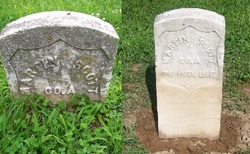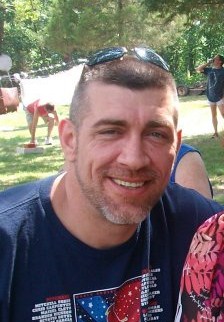
They Would Have Shot Him Forthwith Written by Laura . Posted in Genealogy Martin Van Buren Scott was born October 11, 1828 in Raleigh, North Carolina to Henry and Lucy (Evans) Scott at a time when Southern states were passing strict laws prohibiting the education of even Free Blacks. Martin was brought to Indiana by his parents and grandparents when he was four years old. His family settled in Wayne and Orange Counties, working as farmers and wagon makers, before Henry, Lucy and Martin came to Owen County in the 1850s. When the Civil War broke out most of Indiana's African American soldiers were part of the Twenty-eighth United States Colored Troops. Martin Scott, however, enlisted in the 19th Indiana Regiment, Company I, a "White" regiment mustered out of Owen County on March 17, 1864. It was soon after this that Martin and the Indiana 19th found themselves engaged in the Battle of the Wilderness which raged across 70 square miles of rugged terrain in Central Virginia on May 5, 6 and 7, 1864. It was here that Martin Scott was shot through the thigh. Lieutenant John Dittemore, also wounded, later recalled how Martin Scott crawled over him in the battlefield and they lay side by side before being captured by the Confederates. Upon his capture Martin Scott was incarcerated at the infamous Andersonville Prison at Fort Sumpter in Georgia. In his 1918 obituary, published in the Owen Leader, it states that, "He often spoke of his predicament while a prisoner and stated it was lucky for him that he was no darker skinned than the majority of the weather tanned yankees. Had it been known that he was a "EDITTED African American", they would have shot him forthwith." On September 2nd, 1864, General Sherman's Army took Atlanta and Union prisoners were moved from Andersonville to more secure locations. Martin Scott was moved first to Camp Lawton in Millen, Georgia but as Sherman and his Army approached Millen as they Marched to the Sea Martin was moved again before being released May 24, 1865. In all, 12, 913 of the 40,000 Union soldiers held at Andersonville Prison died from starvation, disease and ill-treatment, accounting for fully 40% of all Union fatalities in the South. After the War the superintendent of Andersonville Prison, Dr. Henry Wirtz, was found guilty of eleven counts of "murder in violation of customs of war" and was hanged November 10, 1865. He is the only Confederate tried for war crimes by the US Government after the Civil War. In Carl Anderson's 1943 book, As I Remember It, he describes Martin Scott as one of four men, all former prisoners at Andersonville he considered by be his heroes, writing, "Scott was a "EDITTED African American", but not very dark. Had the Confederates known he was a "EDITTED African American" they would have made short work of him."After the War Martin returned to Owen County where he lived the life of a well respected famer. He was married twice, first to Reana Walden with whom he had three children, and then to Almira Griffin with whom he had four sons and two daughters. He was active in the African Methodist Episcopal Church in Spencer, an organization that Charles Blanchard's 1884 History of Owen County notes, "Considering the great difficulties under which they labored, the members of the African Methodist Episcopal Church deserve great credit for what they've accomplished, and the support and encouragement of the community in the future."Martin's father, Henry Scott, died 1890. His obituary, published in the Owen County Journal, states that he, "was known as an honest and industrious citizen". Martin Scott died after a series of strokes on April 1, 1918 and is buried alongside his wife, Almira, who died in 1920, in Riverside Cemetery, Spencer. His son Noah Scott, a retired butcher, died in the Owen County Home in 1956. In 2001 descendants of Martin Scott met in Owen County along with a representative from the Smithsonian Institute to visit the places where Martin Scott spent the majority of his adult life. *NOTE* Sometime in 1864 the 7th &19th were merged with the 20th.



 RSS Feed
RSS Feed
